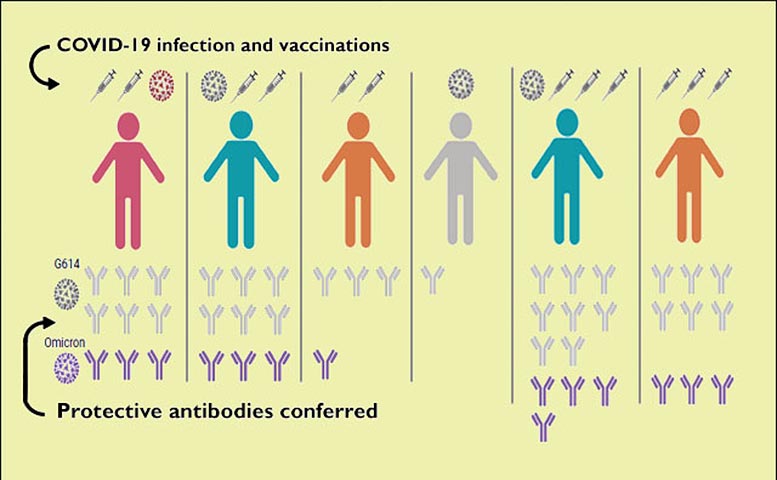Small bit of good news
By UNIVERSITY OF WASHINGTON SCHOOL OF MEDICINE
 |
| The number of exposures to the coronavirus spike protein, through infection or vaccination, influences the degree of antibody response. Credit: Veesler Lab |
People vaccinated three times or vaccinated after an earlier COVID-19 infection had comparable neutralizing antibody activity to those with a breakthrough case.
A
recent study looked at the strength, durability, and breadth of neutralizing
antibody responses generated by breakthrough infections in individuals
vaccinated against SARS-CoV2.
The
findings are published this week in Cell, one of the scientific journals of
Cell Press. Alexandra Walls and David Veesler in the Department of Biochemistry
at the University of Washington in Seattle led the project.
Characteristics
of the Delta and Omicron coronavirus variants of concern include enhanced
transmissibility and immune evasion even in non-immunologically naïve
individuals, compared to the ancestral pandemic coronavirus.
These
characteristics, and the waning of immunity from vaccines, have led to
breakthrough infections in vaccinated individuals. For the most part, otherwise
healthy people who are vaccinated against the SARS-CoV-2 usually
do not have severe symptoms if they do end up contracting the virus.
The
researchers wanted to understand what effect catching the virus after being
vaccinated has on neutralizing antibodies, and to see how durable and broad
these responses are. Their hope is that advancing such knowledge will help
guide vaccination policies and pandemic mitigation strategies.
Through their project the researchers learned that the degree of antibody response depended on whether a person has had one, two, three, or four exposures to the spike protein through infection, vaccination, or a mixture of the two.
The scientists
also checked antibody responses in groups of individuals who had been
vaccinated after having COVID-19, those who were previously vaccinated and
experienced a breakthrough infection, those who were vaccinated only, and those
who were boosted and therefore vaccinated three times.
Among their study subjects, those who had completed a three-vaccination protocol, and those who had been vaccinated after recovering from COVID-19, and those with a breakthrough infection after vaccination launched almost comparable neutralizing antibody responses, in terms of magnitude and breadth.
Their serum
binding and antibody neutralizing responses to the spike protein in the current
pandemic coronavirus variants were much more potent and lasting than those
generated by people who had received only two doses of COVID-19 vaccine or who
had a previous infection not followed by vaccination.
This
observation suggested that the increased number of exposures to SARS-CoV-2
antigens, either through infection and vaccination or triple vaccination,
enhanced the quality of antibody responses.
The researchers also looked at how broad the elicited antibodies could be. They investigated neutralization of the divergent Omicron SARS-CoV-2 variant of concern, currently responsible for the majority of cases in the United States.
Their findings showed that boosted individuals (or those that have a mixture of
infection and double vaccination) have neutralizing antibodies at similar
levels to subjects vaccinated twice against the original ancestral strain. This
suggests a large amount of immune evasion, but that vaccine boosters can help
close the neutralizing antibody gap caused by Omicron.
Looking outside of the SARS-CoV-2 family shows a similar pattern, where repeated and multiple exposures improves the otherwise weak neutralizing antibody response to SARS-CoV. Finally, the authors did not identify improvements in antibody binding to common cold causing coronavirus spike proteins like OC43 or HKU1.
This suggests that repeated SARS-CoV-2 exposure does not improve spike
reactivity to more divergent coronaviruses. These findings support the
development of broader sarbecovirus or coronavirus vaccines to be prepared in
the event of a future spillover event.
The
study groups consisted of about 15 people, from the Hospitalized or Ambulatory
Adults with Respiratory Viral Infections, or HAARVI, project at the UW in
Seattle. HAARVI, led by UW Medicine infectious disease physician Helen Chu,
looks at recovered COVID-19 patients to study immune responses over time, to
understand the long-term consequences of the infection, and to compare immune
responses from vaccines and natural infections.
Reference:
“SARS-CoV-2 breakthrough infections elicit potent, broad and durable
neutralizing antibody responses” by Alexandra C. Walls, Kaitlin R. Sprouse,
John E. Bowen, Anshu Joshi, Nicholas Franko, Mary Jane Navarro, Cameron
Stewart, Elisabetta Cameroni, Matthew McCallum, Erin A. Goecker, Emily J.
Degli-Angeli, Jenni Logue, Alex Greninger, Davide Corti, Helen Chu and
David Veesler, 19 January 2022, Cell.
DOI:
10.1016/j.cell.2022.01.011
Researchers
from the Department of Medicine and the Department of Laboratory Medicine and
Pathology at the UW School of Medicine, and from Humabs Biomed SA, a subsidiary
of Vir Biotechnology, also helped conduct the study.